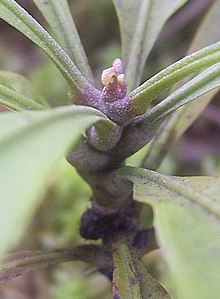Dioncophyllaceae
| Dioncophyllaceae | |
|---|---|

| |
| Triphyophyllum peltatum | |
| Scientific classification | |
| Kingdom: | Plantae |
| Clade: | Tracheophytes |
| Clade: | Angiosperms |
| Clade: | Eudicots |
| Order: | Caryophyllales |
| Family: | Dioncophyllaceae Airy Shaw[1] |
| Genera | |
The Dioncophyllaceae are a family of flowering plants consisting of three species of lianas native to the rainforests of western Africa.
Their closest relatives are Ancistrocladaceae. Both families lie within a clade of mostly carnivorous plants which, since 1998 or so, have been moved to the order Caryophyllales. This clade also includes the families Droseraceae (sundews and Venus' flytrap) and Nepenthaceae (an Old World genus of pitcher plants),[2] as well as Drosophyllaceae.
All species in the family are lianas at some point in their lifecycles, and climb by the use of pairs of hooks or tendrils formed by the end of the leaf midribs. The best-known member is the carnivorous Triphyophyllum peltatum, although the family contains two other species: Habropetalum dawei and Dioncophyllum thollonii.
History of classification
The Cronquist system (1981) had placed the family in order Violales.
The APG II system, of 2003 (unchanged from the APG system, of 1998), does recognize this family and assigns it to the order Caryophyllales in the clade core eudicots.
References
- ^ Angiosperm Phylogeny Group (2009). "An update of the Angiosperm Phylogeny Group classification for the orders and families of flowering plants: APG III". Botanical Journal of the Linnean Society. 161 (2): 105–121. doi:10.1111/j.1095-8339.2009.00996.x.
- ^ Cuenoud, P.; Savolainen, V.; Chatrou, L. W.; Powell, M.; Grayer, R. J.; Chase, M. W. (2002), "Molecular phylogenetics of Caryophyllales based on nuclear 18S rDNA and plastid rbcL, atpB, and matK DNA sequences", American Journal of Botany, 89 (1): 132–44, doi:10.3732/ajb.89.1.132, PMID 21669721
External links
 Media related to Dioncophyllaceae at Wikimedia Commons
Media related to Dioncophyllaceae at Wikimedia Commons
